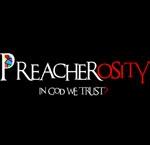Preacherosity
When Baptist churches in Texas are looking for a new minister, or 'preacher', they apparently set up a 'search committee' to find one. They also hold 'auditions' by inviting potential candidates to 'guest' at their church services. So, when a small church in the equally small town of Bubbling Springs finds itself without a preacher, a committee is duly appointed to find a suitable candidate.
The committee in this case is composed of 5 central characters: chairman Elliot is a professor; Christine, a feisty business woman; Morris, a trailer-living gambler with an enormous satellite dish that irritates everyone in town; Vicky, a sensual woman who prays more times each day than a nun, and newcomer Angela who's been invited by Elliot to take notes (which she does at the rate of about 2 words per minute).
Like many small towns, the inhabitants here know each other far too well and know far more of each other's business than is strictly good for them. But they also have dependencies which only become obvious when crises threaten. Larry Herold's script proves adroit at pointing-up these situations effectively, blending drama and comedy along the way.
In the first half of the play though, the committee is finding it hard enough to reconcile their personal differences, let alone wrestle with the task of installing a new minister. Fortunately a candidate unexpectedly presents himself. He's telephoned Elliot out of the blue to offer his services. By now desperate to make an appointment, the committee are faced with a difficult decision because they know almost nothing about him. And when the handsome young preacher turns up, he's even more mysterious than we imagined and seems to have no paper qualifications to back up his ambitions for the job. He turns out to be a card player we met right at the start of the play. Before long, we discover that this preacher knows all the committee's inner secrets, and he also seems intent on acquiring the post. This proves difficult because the committee can't agree and their wrangling is only resolved - and the preacher duly appointed - when some dubious bribery is employed to convince the dissenting committee members.
The second half is set in church and the minister reveals more of his detailed knowledge about the committee members, their secrets and foibles. For example, Christine forged a resume to get a much-needed job, Vicky stripped in order to pay her father's debts and Angela left the scene of a car crash. Although this led to rather more in the way of drama as opposed to comedy - for example, there was a moving scene from Michael Fitzpatrick as Elliot when talking about his wife - overall, the second half left me wondering what the play is really all about. Because the secrets the committee members harbour, at least in some cases, are no more than embarrassing necessities, but then maybe my moral code differs from the author's or those of a Baptist congregation, or maybe that's exactly the point.
The characters in 'Preacherosity' are well-defined thanks to some effective casting, and a confident ensemble who work extremely well together given the constraints of a small space and the need for spot-on timing in terms of the dialogue. Robert Godfrey certainly makes a very handsome preacher, but he had an irritating habit of continually tucking his thumbs into his belt. Other than that minor quibble, there's little to fault in the acting department, and indeed much to commend.
Larry Herold's script is well written, and thanks to some tight direction from Omar F. Okai the whole thing moves along at a reasonably brisk pace. However, the committee meeting that takes up most of the first half felt a little stretched to me, and I suspect it could have been judiciously pruned without losing much in the way of either exposition or humour. On the other hand, the second half is a strange mixture of puritanical denouncements and confessions that left me wondering what the point of it all really was, as well as feeling slightly uncomfortable. And though there's considerable humour in the play, I occasionally found myself laughing at odds with the rest of the audience who seemed to find humour in some elements where I found none (and vice versa). Perhaps they were more aware of the kind of church and its proceedings that the play describes.
Finally, I worried about the role of the preacher for some considerable time - and I'm still floundering for a meaningful explanation. Was this character intended to be merely a theatrical device, or a supernatural being - an angel, a demon, Christ, or even God? Or simply the epitome of 'preacherosity', the quality which Christine says is essential in a minister. I'm still not sure. And I'm not sure how sure Herold's piece is meant to make me.
(Peter Brown)
Originally published on
